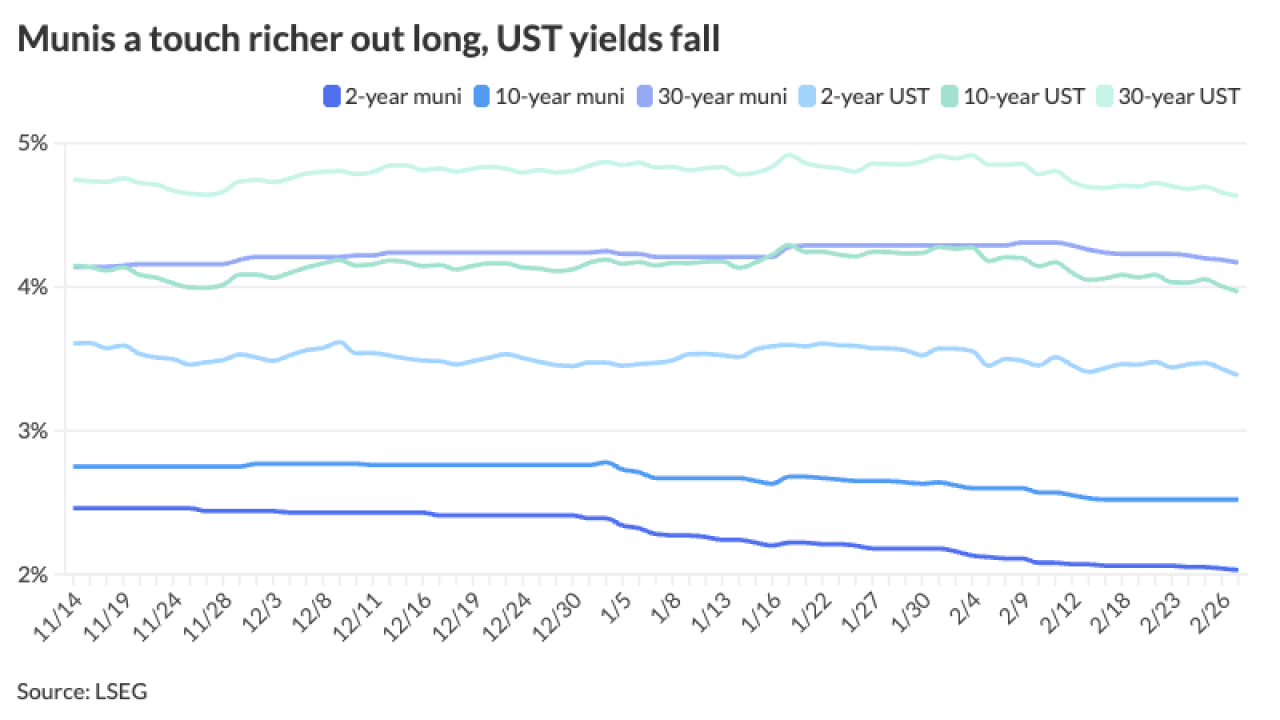
Pension shortfalls are not math problems, but "complex challenges requiring thoughtful solutions, politically challenging to implement," consulting firm Public Financial Management Inc. said in a
"We tried to take a much broader view than other reports on pensions," John White, the chairman and former chief executive of Philadelphia-based PFM, said in an interview. "It's a societal problem with really broad implications for the economy and for people's lifestyles, and that factored into what we are saying."
Click
PFM, which released its report Friday, proposed a multifaceted solution that could include redesigning retirement benefits through renegotiating strategies based on cost-sharing; monetizing assets and closing plans where appropriate; full recognition that pensions, where offered, are part of compensation; and an ongoing commitment to funding.
"Obviously you've got to have some shared sacrifice, not hard-bitten negotiations," said White. "A lot of pension reports assign blame to one party or another. We tried not to do that."
The economic effect is "enormous," according to PFM, which said retirees spend at a rate that equals 5.3% of the gross national product in the United States and hold 36% of the nation's invested capital. And starting in 2016, an estimated 10,000 baby boomers will reach retirement age daily.
Pension liabilities have become a major public finance talking point, with state unfunded obligations estimated as $833 billion.
Bond rating agencies, meanwhile, are attaching greater weight to pension debt, putting further downward pressure on ratings. Illinois' bond ratings dropped as the state's unfunded pension liability soared above $100 billion — Fitch Ratings and Standard & Poor's rate Illinois general obligation debt A-minus while Moody's Investors Service assigns A3 — but last week, the state paid lower yield penalties on its first bond sale last after enacting pension overhaul legislation.
"Rating agencies have begun to look at pension obligations the same way they look at debt. They look at those two things combined," said White.
Legal uncertainty also hovers. Two weeks ago, federal bankruptcy Judge Steven Rhodes ruled that Detroit can cut pensions in bankruptcy, despite Michigan constitutional guarantees. Unions in Illinois promised a legal battle. In Rhode Island, five public-sector pensions sued over a 2011 pension overhaul bill, with talks now in mediation under a state Superior Court judge's order.
"I'm not an attorney, but the [Detroit] idea sounds pretty revolutionary," said White. "If that can be done, it would give employers in the public sector much more power. But I don't think you can work out something without working in a collegial way."
PFM surveyed 12 states: California, Connecticut, Florida, Georgia, Illinois, Maryland, Massachusetts, Ohio, Pennsylvania, Texas, Washington and Wisconsin.
"We were looking at states where we saw a mix of unfunded liabilities, large populations and big infrastructure needs. We also wanted to get geographic diversity," said White, who also serves as a managing director and a member of The PFM Group's board of directors.
According to the report, 11 of the 12 states "made conscious decisions" in the last 10 years to underfund actuarially required contributions as a means to either balance budgets without tax increases or to divert funding to other priorities. The report said Georgia and Wisconsin, which consistently earmarked 100% of their ARC, were in healthier shape than systems in Illinois and New Jersey, which did not.
"Underfunding causes plans to miss market cycles and fall behind in earning investment returns," said the report. "This at times results from lack of political leadership manifested by claims that a budget is balanced even though it does not fully fund the [ARC] contribution."
The report referenced comments in The Bond Buyer by Richard Dreyfuss, Pennsylvania-based senior fellow with the Manhattan Institute free-market think tank, in July when Fitch downgraded that state because its pension debate stalled.
"There's very little political upside to properly funding the state pension systems," said Dreyfuss. "You either have to do it with new revenue, which involves raising taxes, or you cut programs, which instigates a firestorm. The political rate of return on a properly funded pension plan is pretty low."
White suggested states and municipalities consider asset sales akin to the 50-year lease by Allentown, Pa., of its water and sewer system to the Lehigh County Authority public works agency. Allentown used $160 million of its $211 million in proceeds to reduce an unfunded pension liability that threatened to consume as much as one-third of the city budget by fiscal 2015.
PFM advised on that deal. The authority sold $308 million of tax-exempt bonds in July to fund the acquisition.
"I'm sort of a fan of asset sales as a means of extracting equity," said White.
PFM cited some progress over the past five years: 30 states have increased employee contributions; 31 states have increased age or service requirements for new hires; 21 states made changes to post-requirement cost-of-living adjustments, or COLAs; 15 states reduced benefit multipliers; and as of July 1, 11 states offer a hybrid defined benefit-defined contribution plan to large groups of public employees.
"We work at the nexus of government and finance, and we believe solutions to the nettlesome pension-related issues must be found at this junction," said PFM.
PFM just launched a
The center has already been working with the Tennessee treasurer's office and Lexington, Ky. According to White, about a half-dozen senior level PFM personnel work with a group culled from other related disciplines such as banking, labor negotiations and retirement investment. "After listening to our clients, we wanted a multifaceted approach," he said.





